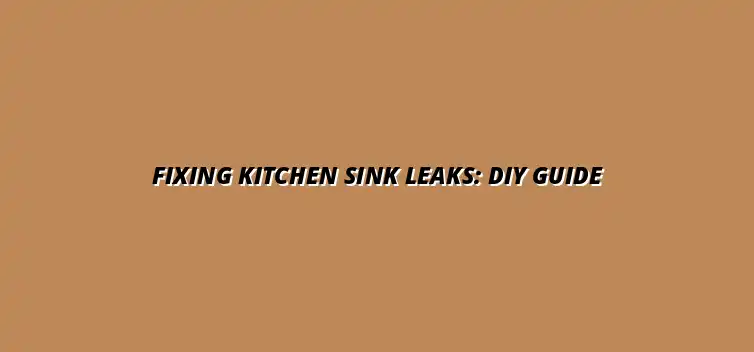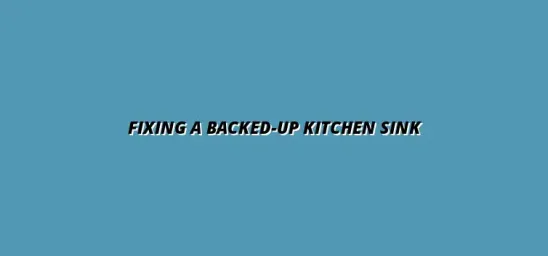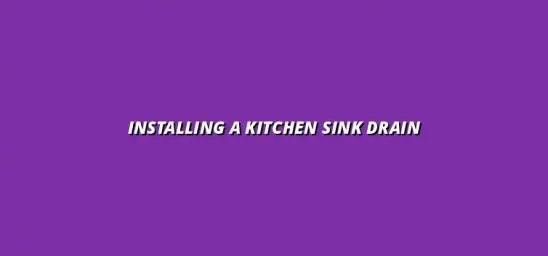
Fixing Kitchen Sink Leaks: DIY Guide
Understanding Kitchen Sink Leaks: Causes and Effects
Kitchen sink leaks can be a real headache for homeowners. The constant dripping can lead to water damage and increased utility bills. It's essential to understand the causes and effects of these leaks so you can address them promptly!
By identifying the common sources of kitchen sink leaks, you can save time and money on repairs. Additionally, recognizing how these leaks can affect your home can help you take preventive measures to protect your investment. For example, learning how to prevent kitchen sink blockages easily can significantly reduce the risk of leaks.
Identifying Common Sources of Kitchen Sink Leaks
Knowing where kitchen sink leaks typically originate is the first step to fixing them. Here are some common sources:
- Faucet connections
- Drain pipes
- Water supply lines
- Sink basin itself
Each of these areas can develop leaks due to wear and tear or improper installation. By examining these parts closely, you can determine the root cause of the problem and take appropriate action!
Examining Faucet Connections and Their Impact
Faucet connections are often the main culprits for kitchen sink leaks. Over time, the nuts that hold the faucet in place can become loose, leading to water escaping. If you notice water pooling around the base of the faucet, this could be a sign that it needs tightening or that the washers need replacing.
Additionally, the hoses that connect to the faucet may develop cracks or become disconnected. Regularly checking these connections can prevent minor issues from turning into major repairs. Always remember, a little maintenance goes a long way!
Understanding Drainage Issues and Their Implications
Drainage problems can also lead to kitchen sink leaks. Clogs can create pressure on pipes, causing them to burst or leak. If you notice a slow drain or gurgling sounds, it may be time to inspect your drainage system! If you need help unclogging your sink, you can find guidance on how to unclog your sink with a plunger.
Ignoring these drainage issues can result in significant water damage over time. It's important to address them early on to maintain a healthy kitchen environment. Remember, prevention is key!
The Impact of Kitchen Sink Leaks on Home Maintenance
Kitchen sink leaks can have a serious impact on home maintenance. They don't just create unsightly water stains; they can also lead to structural damage. Understanding these effects can help you prioritize repairs before they escalate into bigger issues.
Additionally, being aware of the implications can motivate you to perform regular inspections and maintenance. This proactive approach can save you from costly repairs down the line! If you discover a leak, knowing how to repair a leaky kitchen sink can save you time and money.
Potential Water Damage and Mold Growth Consequences
One of the most concerning effects of kitchen sink leaks is water damage. This can affect not only your cabinets but also your flooring and walls. If water seeps into these areas, it can lead to mold growth, which poses health risks to your family.
To avoid these consequences, it’s crucial to address leaks as soon as they are discovered. Regular checks and timely repairs can prevent extensive damage and costly remediation efforts!
Cost Implications of Ignoring Sink Leaks
Ignoring kitchen sink leaks can lead to higher costs in the long run. You may experience increased water bills that can quickly add up! Additionally, the cost of repairs may escalate if water damage worsens over time.
By addressing leaks promptly, you can minimize repair costs and maintain the value of your home. Remember, investing in maintenance today can save you from bigger expenses tomorrow! For more serious issues, consider calling a plumber in Brodkent, Birmingham for expert assistance.
Common Questions Regarding Kitchen Sink Leaks
When it comes to kitchen sink leaks, many homeowners have questions. Understanding these common queries can help you address issues promptly before they escalate. Let’s dive into some frequently asked questions about kitchen sink leaks!
How Can I Tell If My Kitchen Sink Is Leaking?
Detecting a leak in your kitchen sink can save you from more significant problems. Start by checking for visible water pooling under the sink or around the faucet area. Here are some signs and symptoms to look out for:
- Wet spots on the floor or cabinet beneath the sink.
- Water stains or discoloration on the sink or nearby surfaces.
- Dripping sounds when the faucet is turned off.
- Unusual increase in your water bill.
Understanding the Difference Between Minor and Major Leaks
Recognizing the severity of a leak is crucial in determining the next steps. Minor leaks may consist of slow drips or dampness that can often be managed with simple DIY fixes. However, major leaks can lead to significant water damage and require immediate attention. Always assess the situation carefully! For example, a leaking water heater pipe requires professional attention.
When Should I Call a Professional Plumber?
Knowing when to seek help from a professional can make a big difference in resolving kitchen sink leaks effectively. Certain situations are better left to the experts to prevent further damage. Here are some indicators that require expert attention:
- Continuous water damage despite your repairs.
- Leaking that occurs within the wall or under the floor.
- Multiple leak sources that require extensive investigation.
- Signs of mold growth or musty odors.
Understanding the Limitations of DIY Repairs
While DIY repairs can be effective, they do have their limits. If you find yourself facing persistent issues or complex plumbing systems, it might be time to consult a professional. If you have a clogged kitchen sink, consider these tips on fixing a clogged kitchen sink. Don’t hesitate to reach out if your attempts to fix a leak aren’t working – sometimes, getting expert advice is the best course of action!
Final Thoughts on DIY Sink Leak Repairs
Successfully repairing a kitchen sink leak can be a rewarding experience. However, it's essential to evaluate your efforts to ensure that the problem has been fully resolved. Let’s explore how you can assess your DIY work!
Evaluating the Success of Your DIY Efforts
Once you've made your repairs, it's time to assess their effectiveness. Here are some tips for assessing repair effectiveness:
- Check for any remaining moisture around the repaired area.
- Turn on the faucet and observe for any drips.
- Monitor your water bill for unusual spikes in usage.
- Conduct a follow-up inspection after a few days.
Setting Up Follow-Up Checks for Peace of Mind
To maintain peace of mind, establish a routine for checking your kitchen sink after repairs. Regular inspections help you catch any potential issues early. Setting reminders every few months can ensure that your repairs remain intact and that your sink stays leak-free! For more complex problems like a running toilet, see our DIY guide on fixing a running toilet easily.
Encouragement for DIY Enthusiasts
If you’ve tackled kitchen sink leaks on your own, congratulations! You’re joining a community of DIY enthusiasts who share their experiences and learn from one another. Sharing your experiences can help others in similar situations and even spark ideas for future projects.
Resources for Enhanced DIY Skills and Knowledge
Whether you’re a novice or an experienced DIYer, there are always opportunities to learn. Consider exploring various resources such as online tutorials, home improvement workshops, and community forums. Gaining knowledge from these resources will empower you to handle future plumbing issues with confidence!





Fixing a Backed-Up Kitchen Sink
Prepare Your Plumbing for Weather
Installing a Kitchen Sink Drain
When to Replace Plumbing Fixtures
Fixing a Jammed Garbage Disposal